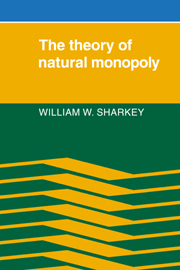Book contents
- Frontmatter
- Contents
- Preface
- 1 Introduction and overview
- 2 Historical survey of natural monopoly
- 3 Natural monopoly and economic theory: some basic results
- 4 Natural monopoly and subadditivity of costs
- 5 Sustainability of natural monopoly
- 6 A game theoretic analysis of destructive competition
- 7 Competition in natural monopoly and natural oligopoly markets
- 8 Noncooperative equilibria in a contestable market
- 9 Natural monopoly and the telecommunications industry
- References
- Index
4 - Natural monopoly and subadditivity of costs
Published online by Cambridge University Press: 06 October 2009
- Frontmatter
- Contents
- Preface
- 1 Introduction and overview
- 2 Historical survey of natural monopoly
- 3 Natural monopoly and economic theory: some basic results
- 4 Natural monopoly and subadditivity of costs
- 5 Sustainability of natural monopoly
- 6 A game theoretic analysis of destructive competition
- 7 Competition in natural monopoly and natural oligopoly markets
- 8 Noncooperative equilibria in a contestable market
- 9 Natural monopoly and the telecommunications industry
- References
- Index
Summary
The most important result to be developed in this chapter can easily be stated: In a world in which competition is ideal, in a way to be described later, there is natural monopoly in a particular market if and only if a single firm can produce the desired output at lower cost than any combination of two or more firms. Natural monopoly is defined in terms of a single firm's efficiency relative to the efficiency of other combinations of firms in the industry. It is possible to test the proposition that a given firm is a natural monopoly.
Not all monopolies are natural. For example, monopoly may result from the control by a single firm of essential inputs into production, through trademarks or patents, or from the exclusive right to sell in a certain market. The essential characteristic of this form is that monopoly power is based on the inability of other firms to compete on an equal basis. Monopolies of this sort are generally transitory in nature and may also serve a useful social function, for example, when the granting of a patent gives an incentive for technological innovation. This form of monopoly, however, is not a natural monopoly.
Monopoly power may also result from unfair practices, such as predatory pricing, by one firm against its competitors, or from the formation of a cartel of several firms in a market.
- Type
- Chapter
- Information
- The Theory of Natural Monopoly , pp. 54 - 83Publisher: Cambridge University PressPrint publication year: 1982



